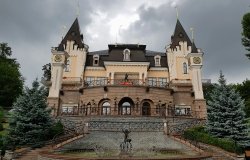
A blog of the Kennan Institute
A Musical Homage to Izium’s Ancient Stone Figurines and Recent Lost Souls

Lithuanian pianist Darius Mažintas carefully adjusted his black bulletproof vest with its blue-and-yellow patch and embroidered Canadian flags as he brought it over his formal black concert attire. A few moments later, he walked out into a cold December fog on Mount Kremyanec near Izium in Ukraine. Barely visible, his concert grand piano stood shrouded in mist, facing a row of anthropomorphic stone larger-than-life female figurines built by the Polovtsians centuries ago.
The nomadic Polovtsians had left their sacred sculptures behind when they made a hasty retreat before Mongol invaders during the thirteenth century. Their stories inspired Alexander Borodin’s opera Prince Igor, which includes the composer’s well-known “Polovtsian Dances.” Nikolai Rimsky-Korsakov and Alexander Glazunov subsequently reworked Borodin’s original score into a stand-alone performance piece.
The statues survived the Mongol marauders, and numerous other conquering armies, relatively well over the centuries, at least until the Russians arrived last year. In March 2022, they launched a battle for the strategically important transportation hub at Izium. Their campaign lasted until September, when Ukrainian forces retook what had once been a town of 45,000 residents. Returning Ukrainian troops discovered a mass grave of 449 civilians and endless tales of war crimes and Russian atrocities.
Russian troops destroyed one of the nine Polovstian stone statues completely and heavily damaged the others. Mažintas intended to play a concert to heal the spiritual breach inflicted by the invaders. The audience consisted of the remaining stone women as well as local residents who happened by.
When the war began, Mažintas turned to exploring the work of Ukrainian composers, discovering the works of Valentyn Silvestrov as part of that journey. Silvestrov, who now lives in Berlin, has been a figure on the Kyiv music scene since graduating from the Kyiv Conservatory in 1964. He often was at odds with Soviet authorities after he walked out of an official composers’ meeting convened to endorse the 1968 Soviet invasion of Czechoslovakia. His music is known for a postmodern style that emphasizes a tapestry of dramatic textures through traditional tonal and modal techniques.
Following Ukrainian independence, Silvestrov rediscovered his student notebooks, which included the beginnings of a delicately beautiful song cycle that he brought together as “Naïve Music.” These quiet, elegant piano solos provided the perfect emotional expression of loss, quietude, and beauty necessary to pay homage to the damaged sacred figures and the hundreds of those tortured and killed by the Russians.
Now forty in 2022, Mažintas had already checked off many accomplishments expected of a rising concert pianist. He pursued conservatory training, entered numerous prestigious music competitions, and performed to good reviews in concert halls across Europe. He entered politics, serving as Lithuanian vice minister of culture in 2013 and 2014. His December 2022 recital in a mist-covered Ukrainian field was unlike anything he had done before.
Mažintas’s performance was arranged and sponsored by Canada’s Looking at the Stars Foundation, which has sponsored numerous recitals similar to this one in a variety of locales. Created by Soviet-era refugee and current Toronto-based tech executive Dmitri Kanovich, Looking at the Stars seeks to affirm humanity through the gift of classical music, since it offers positive energy and affirms hope and dignity in a world in which both are “in short supply.” The foundation sponsors classical music recitals such as that by Mažintas in correctional and long-term care facilities throughout Canada.
Kanovich brought his approach to healing through music to Ukraine shortly after the Russian invasion in early 2022. The first foundation-sponsored concert took place on April 26 in Kyiv, to honor those who died in the devastated city of Irpin. Mažintas’s Izium recital was the second such performance in Ukraine.
For a brief moment last December, Mažintas’s quiet performance of Silvestrov’s ethereal score brought a quiet moment of dignity and peace to a fog-covered field in a war-torn country. The music spoke of a beauty that is waiting to return.
The opinions expressed in this article are those solely of the author and do not reflect the views of the Kennan Institute.
See our newest content first.
Subscribe to receive the latest analysis from Focus Ukraine.
About the Author

Blair A. Ruble
Former Wilson Center Vice President for Programs (2014-2017); Director of the Comparative Urban Studies Program/Urban Sustainability Laboratory (1992-2017); Director of the Kennan Institute for Advanced Russian Studies (1989-2012) and Director of the Program on Global Sustainability and Resilience (2012-2014)

Kennan Institute
The Kennan Institute is the premier US center for advanced research on Eurasia and the oldest and largest regional program at the Woodrow Wilson International Center for Scholars. The Kennan Institute is committed to improving American understanding of Russia, Ukraine, Central Asia, the South Caucasus, and the surrounding region though research and exchange. Read more













